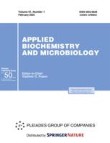
Abstract
Producer strains have been created with an expression system based on the recipient strain Penicillium verruculosum 537 (ΔniaD) and the cellobiohydrolase-1 gene promoter. These strains made it possible to obtain new enzyme preparations (EPs) for feed production that were characterized by a high content of endodepolymerases (endo-β-1,4-glucanases and endo-β-1,4-xylanase), which degrade nonstarch polysaccharides (NSPs) of grain cereals used as a feed component. The proportion of endodepolymerases in the new EPs was 44–68% of the total protein content (as compared to 15% in the recipient-based preparation), whereas the percentage of exodepolymerases (cellobiohydrolases) fell to 8–26% as compared to 60% in the recipient strain-based product. The new EPs have a high specific activity of endodepolymerases, which was 1.8–4.6 times greater than that in the EP obtained from the recipient strain, and the specific activity of exodepolymer ases decreased by 2.0–3.7 times. The new EPs demonstrated endoglucanase and xylanase activities in a wide range of pH and temperature, including the physiological values of these parameters (pH 3.0 and 7.0, and t 37–38°C). They were characterized by high endodepolymerase stability under the action of digestive proteases (pepsin and trypsin). The EPs also retained their endoglucanase and xylanase activities during feed granulation (80°C). The xylanase contained in the new EPs was not affected by proteinaceous inhibitors from cereals. Experimental batches of EPs were made by the Agroferment enzyme-producing plant and were tested in broiler and piglet feeding. The addition of the new commercial EPs to the animals' diets increased their live weight, reduced feed and protein intake, and decreased the metabolic energy per unit of body weight, improving digestibility and assimilability of feed nutrients, especially raw fiber and NSP.



Δεν υπάρχουν σχόλια:
Δημοσίευση σχολίου
Σημείωση: Μόνο ένα μέλος αυτού του ιστολογίου μπορεί να αναρτήσει σχόλιο.